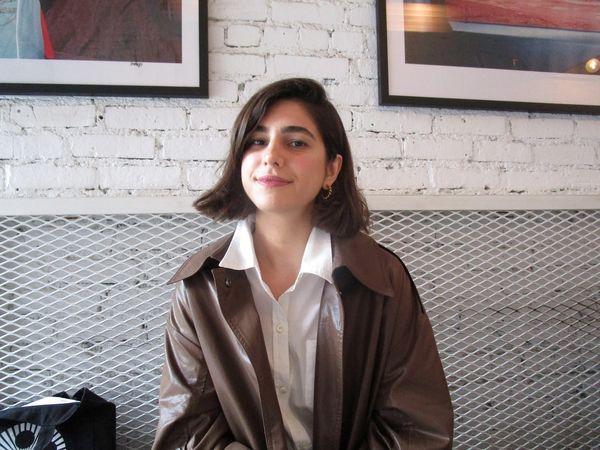The 2nd annual FFFEST screened Bette Gordon’s Variety and I-94; Kirsten Johnson’s Cameraperson with Sofia Bohdanowicz’s Veslemøy’s Song; Nadia Farés’s Honey And Ashes; Kei Fujiwara’s Organ with Shinya Tsukamoto’s Tetsuo: The Iron Man; Shirin Neshat’s Women Without Men with Forough Farrokhzad’s The House Is Black; Laurie Simmons’ The Music Of Regret (starring Meryl Streep, shot by Edward Lachman, edited by Laura Israel, produced by Don Rosenfeld), and a Women From Ghetto Film School free short film programme.
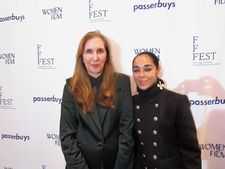 |
| Laurie Simmons with Shirin Neshat on the FFFEST red carpet Photo: Anne-Katrin Titze |
A panel with Erin Lee Carr (I Love You Now Die), Desiree Akhavan (The Miseducation Of Cameron Post), Dianna Agron (Berlin, I Love You), moderated by film critic Hunter Harris (Vulture) on How To Break In & Navigate Your First Film Deal and a Women in Film Programming panel with Mahen Bonetti (New York African Film Festival), Cristina Cacioppo (Alamo Drafthouse Downtown Brooklyn), Nellie Killian (Migrating Forms festival, Sarasota Film Festival), moderated by Jon Dieringer (Screen Slate) were also part of the festival founded by Clémence Polès, Mimi Packer and Nathalie Fält.
At Happy Bones on Broome Street a few days after the run of FFFEST at the Quad Cinema in New York, Clémence and I discussed the evolution of the festival and how she sees its future impact, her ethos of sharing information, and empowering women in film.
Anne-Katrin Titze: When I arrived, you said that there are three founders of the FFFEST. Who are you?
Clémence Polès: So, it's me, Clémence Polès, Mimi Packer and Nathalie Fält. We founded this a year ago and we launched our first edition in L.A. at the Downtown Independent. We decided to bring this to New York for our second edition. Both Mimi and I are based in New York, so it was kind of important for us to bring it here.
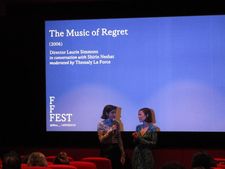 |
| Clémence Polès and Mimi Packer introducing The Music of Regret Photo: Anne-Katrin Titze |
AKT: Why did it start in LA?
CP: We thought that in LA most screenings are private screenings and it just didn't feel that the programming was there, especially for women focused programming, so we thought L.A. was an important place to start and to really make this as accessible, as resourceful as possible for young filmmakers, as well as filmmakers that are trying to break in. This festival is really about being celebratory as well as a resource for filmmakers at any stage of their career.
AKT: The FFF in your name…
CP: … we decided to pronounce it 'FEST', because it's easier to pronounce. It stands for Female Filmmakers Festival. Female identifying, of course.
AKT: So this year you were in New York at the Quad for one weekend, packed with screenings and panels and discussions. Are you planning on jumping to a different city each year?
CP: I think the idea was to bring it to different cities and hopefully bring it in smaller cities that don't have access to this. We're still figuring that out. We need to fundraise again and it will all depend on the resources and help that we get for the next edition.
AKT: The [sold out] event I attended last weekend with Laurie Simmons and Shirin Neshat was very interesting. How did it come about?
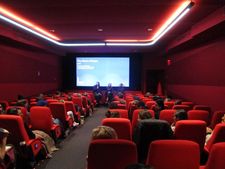 |
| The New York Times T Magazine Thessaly La Force moderating discussion with Laurie Simmons and Shirin Neshat Photo: Ed Bahlman |
CP: Laurie had mentioned that she's pretty close to Shirin. So why don't we have a conversation between them? They both are artists that are filmmakers as well and I thought a conversation could be interesting. Laurie had mentioned that this was a topic that she was also interested in and there's a lot of frustration. I thought that could be interesting to talk about further.
AKT: Laurie e-mailed me about the festival. I hadn't heard of it before. I liked how hands-on it felt.
CP: This is purely our love, sweat and tears. And I think that's also why the filmmakers responded so well. They see the passion that we put into this. We really wanted to celebrate their work and offer the audience as much resources and help that is possible.
AKT: You didn't have any premières but it seems you were looking for overlooked treasures, films that should be seen again.
CP: Absolutely. I mean distribution for women-made films is really tricky and a lot of the older films that are just in print were not converted to DCP. The distributors didn't really see money signs attached to it. And I feel like that's a reason why these films are lost and overlooked.
I feel like the narrative is often that: There are not that many women filmmakers and we need more. Yes, we always need more women filmmakers, but actually, no, we need access to works of women filmmakers. I think that's the issue, the access and education.
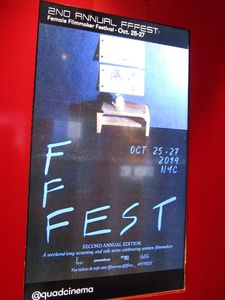 |
| FFFEST poster at the Quad Cinema in New York Photo: Anne-Katrin Titze |
And a lot of people that came this weekend weren't aware of any of those films. I think these are some of the best films ever made and that's why we put those films forward. Women Without Men - how have we missed that?
AKT: Shirin herself was pointing out the problems very clearly. The "art world" isn't even interested in watching her film.
CP: Which is odd as well. You would think, considering her career, that the art world would be supportive of that. And the film is great, at the end of the day.
AKT: Selling a film is a different thing than an object you can display on your veranda for prestige.
CP: Absolutely.
AKT: Kirsten Johnson's wonderful Cameraperson was in your program.
CP: She mentioned as well that it didn't pick up in France, for example, which I feel is so surprising, again.
AKT: It is surprising.
CP: This festival is important to me because I really do want to change that narrative so that these films get the spotlight that they deserve.
AKT: Just this week I read in an article in The New Yorker about overlooked women in Hollywood, among them Mary Blair, who was an animator for Disney. She did the playing card sequence in Alice in Wonderland, for example. I remember attending an event at MoMA about her many years ago. But then she sank again into oblivion. There is so much to discover that changes the narrative.
CP: I don't know where the solution is. I mean you have places like MoMA that have incredible programming. They screened the works of Safi Faye and she is extremely overlooked. But then what happens? MoMA will do that but what about the rest of the world? How can we have access to those films?
 |
| Women Without Men and Looking for Oum Kulthum director Shirin Neshat with 99 Records founder Ed Bahlman at the Quad Cinema Photo: Anne-Katrin Titze |
I'm not saying that our festival is changing that at all, but I think it's important that everyone participates. I do think it's a group effort. And frankly, programming these films I felt that a lot of other curators and programmers were very supportive.
AKT: It's important to have contacts.
CP: A huge supporter has been Mahen [Bonetti] from the African Film Festival. She has also been a mentor to me. She introduced me to Shirin, actually. I do think it's important for all of us to share information and to take this as a group effort.
AKT: Totally. Many women filmmakers speak about how difficult it is for them to get a second film made. It seems to take the women longer, whereas their male counterparts often just churn them out one after the other. Even French filmmakers, although it's a little better.
CP: Because the government funds it. They have the government support. Here it's different. You need to be the best salesperson in order to get your film made. I think it's not a skill that's fair to have for a filmmaker. It's another skill set. In France, in Europe, you can apply for grants. The level of support for films here is not that great.
AKT: Even in France though - I'm thinking of Rebecca Zlotowski or Mia Hansen-Løve as examples, they do have a more difficult time to gain the international recognition they deserve.
CP: They're incredible.
AKT: How is your passerbuys connected to the festival?
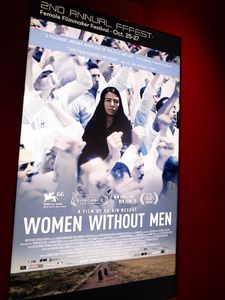 |
| Women Without Men poster at the Quad Cinema Photo: Anne-Katrin Titze |
CP: Passerbuys is also another project of mine. It's a recommendation website for women. My ethos has always been to share as much information as possible and that's how we can kind of change the game. I wanted to create a platform where everyone is open, for example by sharing their favourite book or how they got that job. What were the steps to who they contacted?
I wanted to create a space where you can get as much inspiration and have something concrete that you can take away from it. I really wanted to focus on what as a reader you can take away and apply to your everyday life. That ethos of sharing information was applied to my love of cinema with FFFEST. I'm not a filmmaker but there are obviously problems in the industry. Right now I think we're really in a place where we need to empower women in film.
AKT: There are a lot of recommendations we get from cinema. You want certain things, not just objects, but ideas too.
CP: Life lessons, absolutely. I learned English through cinema. I'm a French native and here I am with an American accent because of cinema.
AKT: The first thing you asked when I came into Happy Bones, was about my boots.
CP: And you told me where you got them from, rather than say "Oh, it's vintage. You don't need to know."
AKT: And immediately, when I said "They are Joseph and I recently had them resoled," it took us no time at all to talk about quality, fast fashion and pollution.
CP: It goes deep. It connects too, recommendations. With all the women I profile, the things that come up often are Patti Smith's Just Kids. It's one of the most recommended books. From an anthropological standpoint I think it's fascinating.
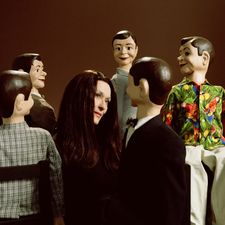 |
| Meryl Streep in Laurie Simmons’ The Music Of Regret |
AKT: What about cinema?
CP: Yes, they put in their recommendation for film. I'm also asking them for women-directed recommendations too.
AKT: Any trends there?
CP: You know, Call Me By Your Name comes up a lot.
AKT: I asked Luca Guadagnino about the clothing in his film. It's fascinating. This afternoon I am meeting with Ann Roth, one of the greatest costume designers. She did Klute, Marathon Man, The English Patient, Hair in the Seventies, Working Girl in the Eighties, recently The Seagull with Annette Bening. Incredible work in every decade.
CP: Are you doing a feature on costume design? Because I know another, Miyako [Bellizzi], who has done the costumes for Uncut Gems, with Adam Sandler, done by the Safdie brothers. She's done an incredible job. The film takes place in 2012, during the [NBA] Eastern Conference semifinals.
AKT: The other costume designer I was about to meet, but she didn't make it to New York, is Milena Canonero. She did the costumes for the majority of Wes Anderson's films.
CP: She created a trend. Her impact in fashion is huge.
AKT: Costume designers are a direction that is interesting to look into more, their impact is so often overlooked.
CP: Or set designers, that's something that's often overlooked. The music - I mean, the score composers are often male. It would be interesting to just push towards female composers. One of the best composers of Anime is actually a woman.
AKT: Do you feel exhausted or exhilarated after your festival? Both?
CP: Both. We've been working on this for almost a year to just do this tiny little festival that runs over three days. You kind of get lost on why you're doing it. Coming out of this I'm happy that I haven't lost the passion or love for this. And I'm ready for the next one.
The 2nd annual FFFEST took place in New York from October 25 through October 27 at the Quad Cinema.








